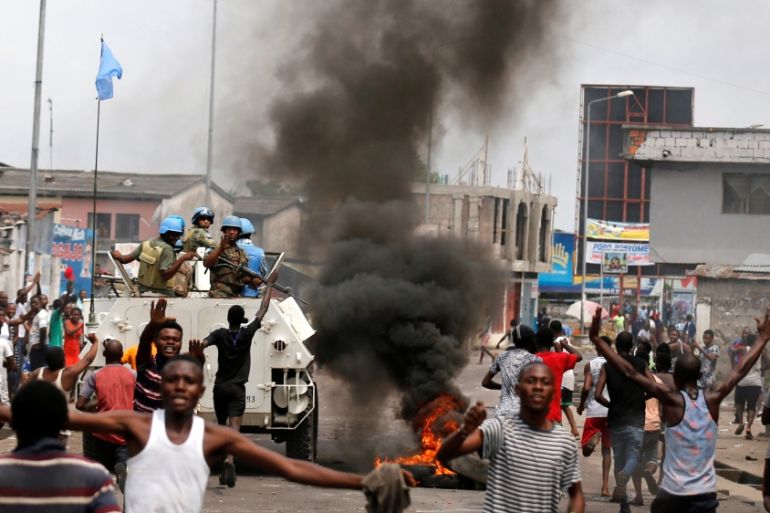DRC: Church calls for peace after deadly clashes
Church appeals for resolution as tensions rise over President Kabila’s refusal to step down from power.

The Catholic Church in the Democratic Republic of Congo (DRC) has appealed for a resolution to the ongoing political standoff over the future of current President Joseph Kabila.
The call by the church comes after 34 people were reportedly killed and 45 others wounded in clashes between police and protesters who took to the streets to protest against Kabila’s refusal to step down from power.
The protests took place in Kinshasa and the eastern city of Lubumbashi.
Kabila’s second term officially ended on Tuesday. He is constitutionally barred from seeking a third term but under a controversial recent constitutional court order, he may stay on until a successor is chosen.
“Our wish is to end before Christmas,” said Episcopal Conference (CENCO) chairman Monsignor Marcel Utembi. “If the political and civil society actors do not reach a compromise by then … CENCO will draw the consequences.”
UN Secretary-General Ban Ki-moon on Wednesday urged the government and opposition to work constructively to reach a deal.
The UN backs the CENCO-facilitated dialogue.
So far the mainstream opposition has called for “peaceful resistance” from the country’s 70 million people, pinning its hopes on a deal at the negotiating table.
Al Jazeera’s Mohammed Adow, reporting from the Congolese capital Kinshasa, said officials have been widely criticised for the heavy-handed nature of their crackdown on protesters.
African response
On Tuesday, the South African government expressed concern “about the current situation in the Democratic Republic of the Congo and condemned any outbreak of violence.
“These incidences threaten the hard-won democratic gains made by the DRC through the past two elections,” the department of international relations and corporation said in a statement.
But in what Kabila’s opponents dubbed a provocation, a new government was announced overnight on Monday, headed by Samy Badibanga.
The freshly appointed cabinet is part of an October deal struck between the ruling party and tiny fringe opposition groups, enabling Kabila to remain in office pending elections in April 2018.
The main opposition bloc headed by 84-year-old Etienne Tshisekedi rejects the plan. It wants elections next year – along with a pledge that Kabila will not stand.
Maman Sambo Sidikou, the head of the UN mission in Congo, had voiced alarm on Tuesday about a wave of arrests of opposition leaders, rights campaigners and journalists since December 16.
Similar concerns were raised by Ida Sawyer, Central Africa director of Human Rights Watch in a blog published on the watchdog’s website.
|
|
| Can another civil war be avoided in Democratic Republic of Congo? |
In a YouTube video, Tshisekedi launched “a solemn appeal to the Congolese people to no longer recognise the authority of Mr Joseph Kabila, to the international community to no longer deal with Joseph Kabila in the name of the Democratic Republic of Congo”.
He urged people “to peacefully resist the coup d’etat”.
The message was not available in DRC, where authorities have since Sunday imposed strict controls on social media networks.
According to Sawyer, authorities had blocked the signals for the Congolese news outlets seen to be close to the opposition, including Canal Congo TV (CCTV) and Radio Liberté Kinshasa, on Monday.
“The signal for Radio France Internationale (RFI), the most important international news outlet in Congo, has been blocked in Kinshasa since November 5,” Sawyer said.
The president has been in office since his father Laurent Kabila’s assassination in 2001. He was elected in 2006, and again in 2011.
Two decades ago, the country collapsed into the deadliest conflict in modern African history. Its two wars in the late 1990s and early 2000s dragged in at least six African armies and left more than three million dead.